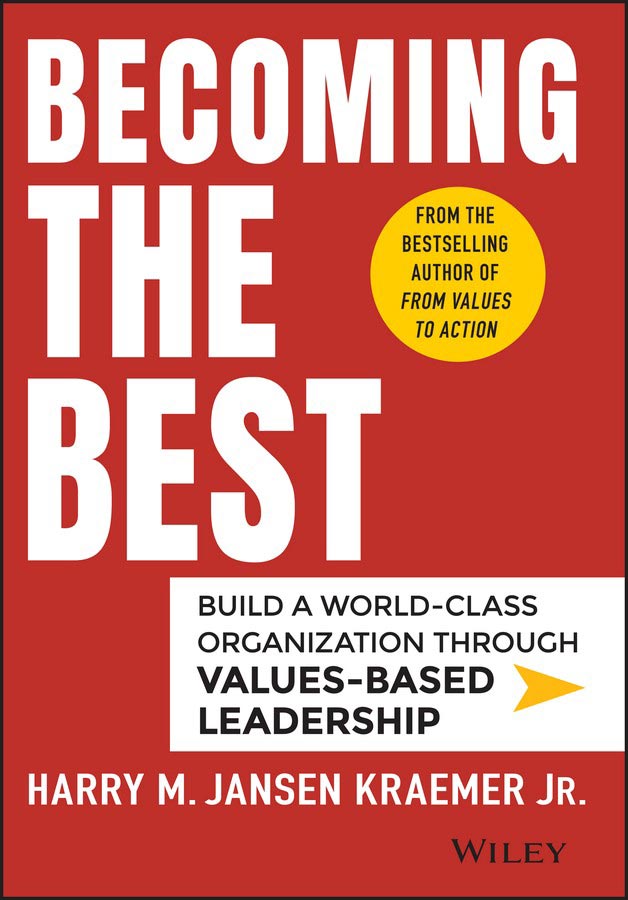Becoming the Best: Build a World-Class Organization Through Values-Based Leadership by Harry M. Kraemer
March 05, 2015
Harry Kraemer's follow up to From Values to Action is a how-to guide to applying values-based leadership principles in your daily life.

Becoming the Best: Build a World-Class Organization Through Values-Based Leadership by Harry M. Jansen Kraemer Jr., Wiley, 224 pages, $28.00, Hardcover, March 2015, ISBN 9781118999424
In the interest of full-disclosure, we should tell you that Harry Kraemer’s first book, From Values to Action, has been our best-selling book for the last three years now; We have done a lot of business with him. And for that we are not only grateful, we are extremely lucky.
You see, it’s one thing to do a lot of business with any individual or organization (that’s the grateful part), it’s another thing entirely to find one that aligns so closely to your own values, and to be able to move a book you believe so strongly in—and that is where we count our lucky stars. Shipping literal boatloads of From Values to Action into the world has been great for our bottom line, but we also get the satisfaction of knowing that it’s helping change the way people live and lead—one book at a time.
From Values to Action introduces us to Kraemer’s conception of values-based leadership, and his new book, Becoming the Best, furthers this work. It is his answer to the questions he’s been asked while on the road giving more than eight talks per month over the last four years about applying values-based principles in daily life. It is, as he puts it, “a how-to on values-based leadership.”
Becoming the Best has five major components, with a section devoted to each: becoming your Best Self (focused on the individual and becoming your best, authentic self), becoming the Best Team (every team member able to link what they do to the overall goals and objectives of the organization), becoming a Best Partner (moving beyond individual financial transactions and focusing on the customer experience), becoming the Best Investment (returns being measured in more than monetary terms), and becoming the Best Citizen (making a difference in the community and the world).
Diving into the topic of becoming the Best Partner, and the human element of the supply chain, Kraemer clarifies why we’re all really in business in the first place:
On the surface, a supply chain is about the movement of goods and services from manufacturer to distributor to end user. It involves such unemotional elements as cost of goods and logistics. Going deeper, however, the picture changes when questions arise such as: Who are the end users? What is behind the demand and urgency for obtaining these products and services? What would be the consequences of supply disruption? In short, what is the impact of this product or service on the lives of the ultimate end users … The answers to these questions provide context and meaning to the supply chain, and remind all parties why the partnership is far more than a mere transaction.
To illustrate how this looks in the real world, he shares a story from Baxter International, the healthcare company he spent 22 years in, and led as its CEO for the last six years of his tenure there. Knowing that the products they supplied to hospitals would have to be individually sterilized and bundled by hospital staff for different surgeries and procedures, Baxter decided to simplify things and save time for their customers:
Baxter saw an opportunity to deepen its customer relationship with a new line called Custom Sterile, which provided sterile supply packs customized for specific operations or procedures. The cost savings in terms of storage and time was significant, and the product line contributed to greater efficiency in the operating room, which is the most expensive area of the hospital.
Since leaving Baxter in 2004, Kraemer refined his own values-based approach to leadership into one of the most popular classes at Northwestern University's Kellogg School of Management, and From Values to Action came out of that class. He boiled it down to four very human and close-to-the-ground principles: Self-Reflection, Balance, True Self-Confidence, and Genuine Humility. These are seemingly simple principles, but they can be hard to live. It amounts to "doing the right thing rather than being right," which means setting aside one's ego, questioning and considering all approaches and angles even if they seem antithetical to you, and still having enough sense of self to make a determined decision and stand behind it.
Becoming the Best is his response to how his ideas have been met in the real world by others, and teaches us how to apply them practically in the day-to-day. And the message is clear: this is not only the duty of those at the top of the organization.
People at every level and with any job title can and should become values-based leaders—those who lead with principles and live by example.
The questions he’s answering in the book have come from every level and every kind of organization, from people just like you: “They are CEOs and other C-level corporate officers, executive managers, middle managers, entry-level individuals, and students.”
And, whoever you are and wherever you want to fit into this world, his call to action is as simple as it is sagacious:
We cannot merely look at the world and complain about a lack of leadership in general or values-based leadership in particular. We must be change agents within our organizations, communities, and society at large. The values we embrace must be visible to others by our actions, decisions, and how we interact with and treat others.
Becoming the Best is going to help a lot of people do that. We look forward to helping spread the word and getting this new book into the hands of so many waiting for its lessons.



